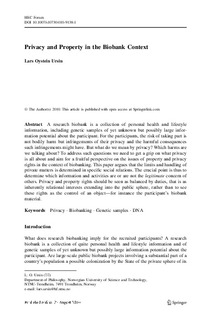| dc.contributor.author | Ursin, Lars Øystein | |
| dc.date.accessioned | 2015-01-29T14:54:30Z | |
| dc.date.accessioned | 2015-12-14T11:59:55Z | |
| dc.date.available | 2015-01-29T14:54:30Z | |
| dc.date.available | 2015-12-14T11:59:55Z | |
| dc.date.issued | 2010 | |
| dc.identifier.citation | HEC Forum 2010, 22(3):211-224 | nb_NO |
| dc.identifier.issn | 0956-2737 | |
| dc.identifier.uri | http://hdl.handle.net/11250/2367626 | |
| dc.description.abstract | The papers in this special thematic issue of HEC Forum critically and
carefully explore key issues at the intersection of patient privacy and commodification.
For example, should hospitals be required to secure a person’s consent to any
possible uses to which his discarded body parts might be put after his treatment or
should it only be concerned with securing his informed consent to his treatment?
Should a hospital be required to raise the possibility of the commodification of such
(patient-discarded) body parts, or should it only be required to address this issue if
the patient asks about it? Should persons be paid to engage in medical research, or
should they only be compensated for their time, on the grounds, perhaps, that such
payment would be coercive or exploitative, for it might move some persons to agree
to participate in research who otherwise would not have done? This number of HEC
Forum illustrates the widespread implications of these issues upon which healthcare
ethics committees are called to deliberate. | nb_NO |
| dc.language.iso | eng | nb_NO |
| dc.publisher | Springer Verlag | nb_NO |
| dc.title | Privacy and Property in the Biobank Context | nb_NO |
| dc.type | Journal article | nb_NO |
| dc.type | Peer reviewed | en_GB |
| dc.date.updated | 2015-01-29T14:54:30Z | |
| dc.source.volume | 22 | nb_NO |
| dc.source.journal | HEC Forum | nb_NO |
| dc.source.issue | 3 | nb_NO |
| dc.identifier.doi | 10.1007/s10730-010-9135-4 | |
| dc.identifier.cristin | 516566 | |
| dc.description.localcode | The Author(s) 2010. This article is published with open access at Springerlink.com. | nb_NO |
